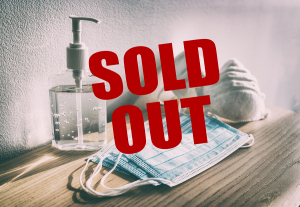par
Gus Iversen, Editor in Chief | April 01, 2020
While most people in the U.S. are busy ensuring they have the necessary supplies and resources to get through the novel coronavirus (COVID-19) pandemic, some enterprising schemers have seized upon the crisis as a way to make a quick buck at the expense of others.
In Tennessee, for example, two brothers set out on a 1,300 mile road trip buying up all the hand sanitizer, respiratory masks and antibacterial wipes they could find with the intention of selling it all at a premium online,
New York Times reported.
In Texas, more than 750,000 medical-grade masks went to the highest bidder on a consumer auction website called Auctions Unlimited,
Bloomberg reported. Bottles of Purell hand sanitizer sold on the website for over $40, and a box of 16 respiratory masks went for $170.



Ad Statistics
Times Displayed: 123641
Times Visited: 7184 MIT labs, experts in Multi-Vendor component level repair of: MRI Coils, RF amplifiers, Gradient Amplifiers Contrast Media Injectors. System repairs, sub-assembly repairs, component level repairs, refurbish/calibrate. info@mitlabsusa.com/+1 (305) 470-8013
For a while, plans like these were working as hoarders intended, but soon a public outcry put pressure on online retailers to stamp out unethical price hikes.
“No one should be allowed to reap a windfall from fear and human suffering,” Massachusetts Senator Edward J. Markey wrote in a letter to Amazon CEO Jeff Bezos on March 4. “Internet-based retailers such as Amazon.com have a particular responsibility to guard against price gouging in current circumstances as consumers — who are finding the shelves of local brick-and-mortar stores bare, and who may wish to avoid venturing into crowded stores and shopping malls — turn to the internet.”
After the two brothers were profiled in the Times, the Tennessee attorney general’s office sent investigators to the home of the hoarders, presented a cease-and-desist letter and began investigating the case. In Texas, the attorney general filed a lawsuit to prevent Auctions Unlimited from price gouging, (although the site owner contends they did nothing wrong).
What started as a money-making strategy turned into a fruitless and illegal enterprise.
When does price gouging become illegal?
HealthCare Business News reached out to Bob Litan, non-resident senior fellow at Brookings Institute, to find out what separates a clever scheme from an illegal racket. It turns out that price gouging laws are primarily determined on the state level. In the absence of a crisis (like the COVID-19 pandemic, or a hurricane, for example) the laws of supply and demand are generally left to their own devices. It's when the government declares a state of emergency, Litan said, that price gouging rules start to factor in.

